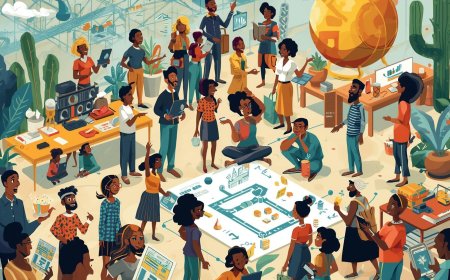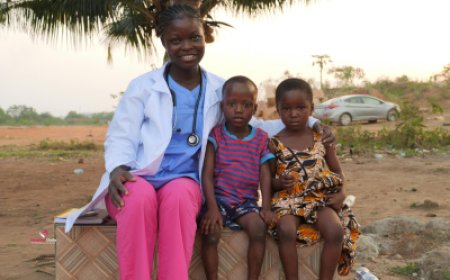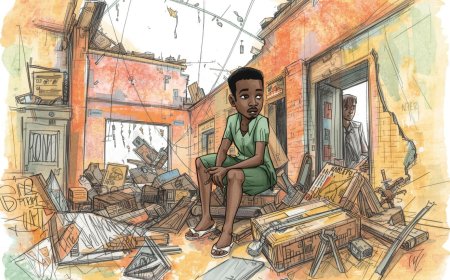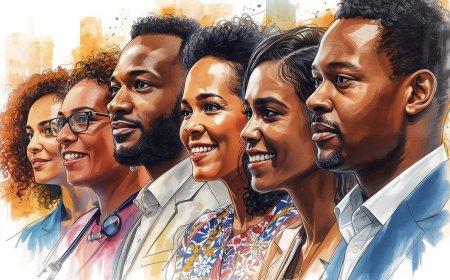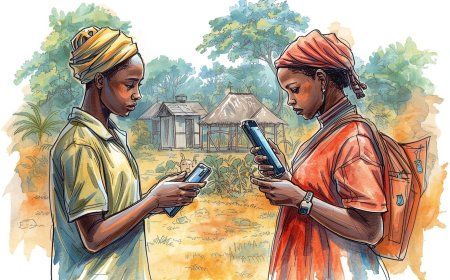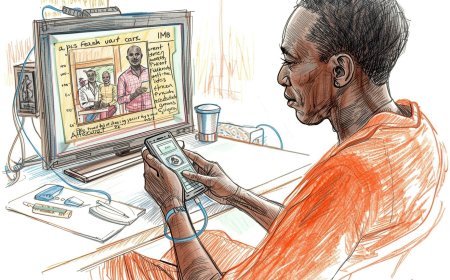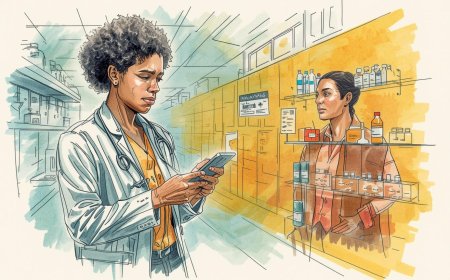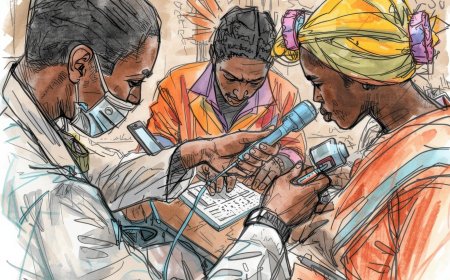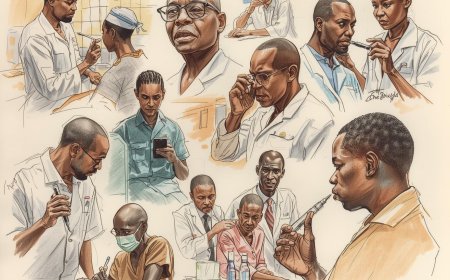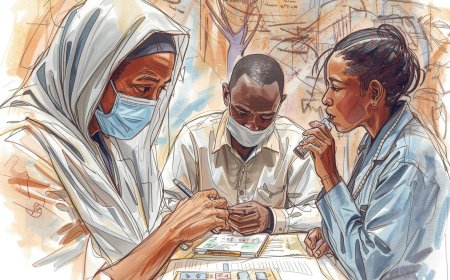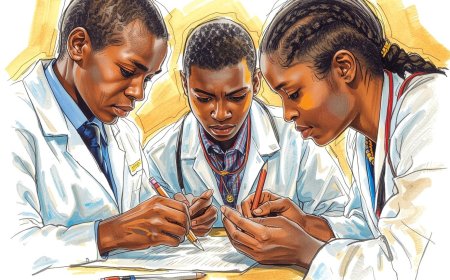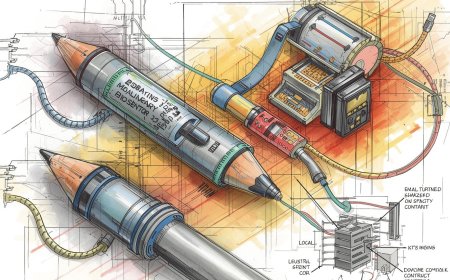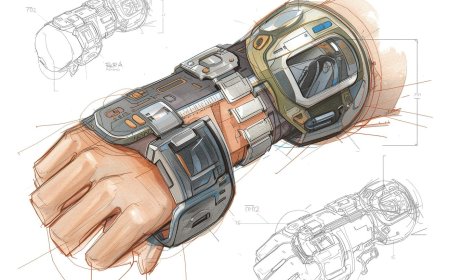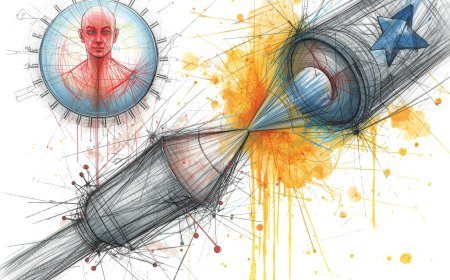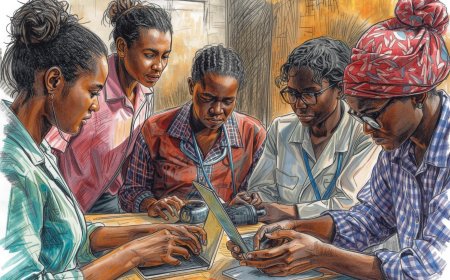Your Grind Tape is the Real Blockbuster: A Founder's Guide to the African Health-Tech Journey
Stop comparing your raw, unedited startup journey to another founder's polished success story. This guide uses African proverbs, wit, and real-world case studies from health-tech startups like Helium Health, LifeBank, and mPharma to inspire African founders to embrace their "grind tape"—the messy, unglamorous process of building a company. Learn why your struggle is proof of progress, not failure.

Introduction: Comparing Your Raw Footage to Their Premiere Night
The scene is familiar to every founder on the continent. It is late, the glow of a laptop screen illuminates a rented room, and a stack of unpaid invoices serves as a silent co-star. A quick scroll through a social media feed presents a jarring contrast: a former classmate celebrating a funding round, a competitor posing with a new fleet of delivery bikes, a caption that speaks of "hard work paying off" as if it were a simple, linear equation. This is the modern entrepreneurial experience: watching someone else's premiere night from the cheap seats, while being surrounded by hours of raw, chaotic, and unedited footage from one's own production.
This report deconstructs this flawed comparison. The act of measuring one's own "grind tape"—the messy, unglamorous, and often painful process of building a company—against another's "highlight reel" is a fundamental misunderstanding of the entrepreneurial journey. It is a comparison of a seedling to a full-grown oak, a script's first draft to a finished film. As an Igbo proverb wryly observes, "A bird that flies off the earth and lands on an anthill is still on the ground".1 That funding announcement is merely an anthill; the real story is in the flight, with all its turbulence and uncertainty.
Following the production process of a startup, this analysis will explore the scriptwriting, the budget crises, and the endless reshoots required to create a successful venture. Using the real-world stories of pioneering African health-tech companies, it will reveal the crucial scenes of struggle, adaptation, and perseverance that were left on the cutting room floor, offering a more honest and ultimately more inspiring picture of what it takes to build something of value.
Part 1: The Scriptwriting Phase – "He Who Throws a Stone in the Market Will Hit His Relative"
The allure of a pre-written script is powerful. Business models that found success in Silicon Valley or Europe are often presented as universal templates, ready to be deployed. Yet, attempting to parachute these foreign solutions into African markets without a deep understanding of the local context is a common and critical error. It is an act of hubris best captured by the Yoruba proverb, "You are given some stew and you add water, you must be wiser than the cook".2 To merely tweak an imported model is to underestimate the complexity and richness of the local "stew." The most successful founders are not those who adapt a foreign script, but those who write an original one, born from immersive, on-the-ground research. As another proverb warns, "He who throws a stone in the market will hit his relative," a reminder that actions in a close-knit community have intimate and unforeseen consequences, demanding a deep-seated local awareness.2
Case Study: Helium Health's Road Trip – Writing the Script on Location
The origin story of Helium Health, founded by Goke Olubusi, Dimeji Sofowora, and Tito Ovia, serves as a masterclass in original scriptwriting. Their journey did not begin in a boardroom with a market research report, but on the roads of Nigeria. The founders embarked on a deliberate road trip, driving from one hospital to the next, not to sell a product, but to listen.3 This was an act of immersive research, designed to understand the daily drama of healthcare providers.
This ground-level investigation revealed the non-negotiable plot points for their future product. They learned that 90% of healthcare facilities were still mired in paper records, creating a "heavily fragmented system" that was opaque and inefficient.4 This reality dictated that their electronic medical record (EMR) system had to be affordable, intuitive enough to be used without extensive training, and, most critically, fully functional offline to cope with unreliable internet connectivity.3 This last feature was not an afterthought; it was a direct response to the lived reality of their target users and became a core differentiator.
This process exemplifies co-founder Goke Olubusi's philosophy of prioritizing "data-driven decision-making" over assumptions.5 The initial, most crucial data for Helium Health was not found in a spreadsheet but was gathered through conversations in hospital corridors and observations of administrative bottlenecks. By immersing themselves in the problem, they wrote a script that was tailor-made for their audience.
The decision to build a product based on the realities of local infrastructure demonstrates a profound understanding of innovation within the African context. The most critical feature of their EMR system—its offline capability—is a direct adaptation to an environmental constraint. This transforms the constraint from a liability into a source of competitive advantage. The "grind" in this part of their story was not sleepless nights of coding, but long days driving on challenging roads to understand a rural clinic's operational reality.
Furthermore, this approach directly challenges the narrative Olubusi identified of the African healthcare market being viewed by outsiders as a "black box".4 The road trip was a deliberate effort to pry open that box. In doing so, Helium Health was not just building a tool for individual hospitals. They were creating the foundational data infrastructure necessary to make the entire market legible to larger stakeholders like insurers, pharmaceutical companies, and public health organizations. The painstaking, facility-by-facility process of digitization is the essential first step in building a transparent, data-driven healthcare ecosystem for the continent. Their initial grind tape laid the tracks for industry-wide transformation.
Part 2: The Budget Crisis – "Patience Can Cook a Stone"
A funding announcement is the quintessential highlight reel. It is a single, triumphant image: founders smiling, a large number on a screen, a press release filled with optimistic quotes. This image, however, conceals the grueling and often demoralizing "race" that precedes it—a marathon of pitching, rejection, and relentless follow-ups. The ancient proverb "Patience can cook a stone" perfectly encapsulates this process, suggesting that with enough persistent effort and unwavering belief, even a seemingly impossible task can be accomplished.7 The journey to securing capital is rarely a sprint; it is a long, slow cook that tests the endurance of every founder.
Case Study 1: LifeBank – Battling the Bias
The founding of LifeBank was born from the deeply personal and urgent conviction of Temie Giwa-Tubosun. Her own high-risk pregnancy, combined with the trauma of witnessing preventable maternal deaths in Nigeria, ignited her mission to solve the critical logistics problem of blood delivery.8 Yet, the power of her mission did not grant her an easy path to funding.
Her early fundraising experience is a raw scene from the grind tape, revealing the deep-seated biases within the investment world. She recalls feeling like an outsider, stating, "I don't look like an entrepreneur: I look big, I'm a mom, I am a girl".11 Investors, she felt, constantly second-guessed her ability to execute. This was not a challenge that could be solved with a better pitch deck; it was a battle against perception and stereotype. The crucial "reshoot" in her funding script came when she strategically reframed her venture. She had to meticulously "educate" potential investors to see LifeBank not as a niche, difficult-to-scale "medical thing" or a charity, but as a "logistics and distribution company" with a vast, addressable market.11 This pivot in narrative allowed her to speak the language of venture capital while remaining fiercely committed to her life-saving mission.
Case Study 2: Ilara Health – Navigating the Aftermath
Ilara Health's story provides a stark, contemporary lesson on the precarity of funding. Their highlight reel was impressive: founded in 2019, the company grew to partner with over 3,000 clinics in Kenya and successfully raised $4.2 million in pre-Series A funding in early 2024.12 This is the polished blockbuster story that makes headlines.
The unedited footage, however, tells a different tale. Just months after this celebrated funding round, the company announced a major restructuring, including painful layoffs. The reason: "adverse market conditions, delayed funding disbursements, and a reversal of investment commitments".13 This case is a crucial reminder that a funding round is not a finish line. It is fuel for the next stage of the journey, and sometimes, the fuel line can be unexpectedly cut by external forces. Ilara's subsequent pivot to focus on its "most cash-generative business lines" is a difficult but necessary edit, an emergency maneuver designed to ensure the entire production is not shut down.13
|
Startup |
The Highlight Reel (What You See on Social Media) |
The Grind Tape (The Unseen Reality) |
|
LifeBank |
"Nigerian Health-Tech Founder Secures Seed Funding for Life-Saving Mission." |
"I had to educate investors to see this as a logistics company, not just a charity. People second-guessed me constantly because I didn't fit their image of a founder." 11 |
|
Ilara Health |
"Ilara Health Raises $4.2M to Expand Diagnostic Access Across Kenya." 13 |
"Months later, we are restructuring due to a reversal of funding commitments and delayed disbursements, leading to painful job cuts to ensure the company's survival." 13 |
|
Your Startup |
The polished LinkedIn post about hitting a new user milestone. |
The ten unpaid invoices, the maxed-out credit card, the investor who ghosted you after three meetings. |
The contrasting experiences of LifeBank and Ilara Health reveal that the funding battle is fought on two distinct fronts. The first is the interpersonal front, where founders like Giwa-Tubosun must overcome conscious and unconscious biases to convince investors of their vision and capability. The second is the macroeconomic front, where a company like Ilara Health, having already won the interpersonal battle, can still be wounded by market volatility, shifting investor sentiment, and geopolitical instability entirely beyond its control. This dual reality complicates the simplistic narrative that a great idea will always find funding.
Ilara's forced pivot toward its most profitable segments contains a critical lesson for all founders navigating this unpredictable landscape. In an environment where external capital can vanish overnight, the relentless pursuit of profitability is more than a business objective; it is the ultimate survival strategy. A sustainable, cash-generating business model is the only true shelter from the storm of volatile capital markets. It connects the abstract threat of "market conditions" to the concrete, actionable imperative for founders: build a business that can, if necessary, fund its own future.
Part 3: The Endless Reshoots – "If You Are Building a House and a Nail Breaks, Do You Stop Building or Do You Change the Nail?"
In the filmmaking of a startup, the "pivot" is often misinterpreted as a moment of panic or failure. In reality, it is a sign of intelligence, resilience, and a director's willingness to reshoot a scene that isn't working. The Rwandan proverb, "If you are building a house and a nail breaks, do you stop building or do you change the nail?" poses a question with an obvious answer.1 Yet, many founders, out of pride or inertia, will continue hammering a broken nail, risking the collapse of the entire structure. The wisest entrepreneurs recognize the broken nail, discard it, and find a new one that works.
Case Study: mPharma's Grand Redesign
The evolution of mPharma is a powerful case study in strategic reshoots. The company's initial script was a relatively simple software solution: an e-prescription network designed to answer the question, "How do we make it easy for patients to know where their prescription drugs can be filled?".15 It was a logical starting point, addressing a clear information gap.
However, the data generated by this initial product quickly revealed that the broken "nail" was not just a lack of information. The true problem was the entire pharmaceutical supply chain in Africa—a system plagued by fragmentation, inefficiency, and exorbitant costs.16 Pharmacies suffered from constant "stock outs," and patients were paying up to three times more for the same drugs than their counterparts in Western countries.16
This realization prompted a monumental reshoot. mPharma pivoted from a simple software platform to a full-stack pharmacy benefits manager and drug inventory management system. They recognized that to fix the problem, they had to rebuild the house's foundation. The company began to use the collective purchasing power of its growing network of pharmacies to negotiate lower prices directly with manufacturers.16 They implemented technology to manage inventory, reducing waste and ensuring life-saving medicines were on the shelves.19 Crucially, they even stepped in to provide financing, allowing small pharmacies to stock their shelves without needing high-interest bank loans.20 mPharma did not just change the nail; they redesigned the entire construction process, becoming an active partner in the financial and operational health of the pharmacies they served.
mPharma's journey is emblematic of a pattern seen in many of the continent's most successful startups. LifeBank experienced a similar evolution; it was conceived as a technology platform to connect hospitals and blood banks but was forced to become a logistics and delivery company because the underlying infrastructure for moving blood safely and quickly simply did not exist.10 In markets with significant infrastructure gaps, a startup often cannot succeed as a thin layer of technology applied to existing systems. It must build the underlying systems itself. This model of vertical integration is operationally complex and capital-intensive, but it creates a powerful competitive advantage and allows the startup to control the user experience and capture value at multiple points along the chain.
The intelligence behind mPharma's successful pivot was not a stroke of genius but a disciplined adherence to data. The company's leaders knew how to reshoot the scene because they were watching the daily takes. They tracked which drugs were dispensed, analyzed the reasons for substitutions (most often cost), and noted the prevalence of patients making micro-payments for partial prescriptions because they could not afford a full month's supply upfront.15 This data was the director's feedback, providing undeniable evidence that the original script was failing to address the core conflict of the story: affordability and access. This reveals a vital truth about early-stage ventures: the most valuable output of a minimum viable product is not revenue. It is the data that reveals what business the company should be in. The grind of building and deploying that first version, even if it is ultimately replaced, is what generates the intelligence required for the blockbuster second act.
Part 4: The Director's Cut – "Wisdom is Like a Baobab Tree; No One Individual Can Embrace It"
The final and most insidious danger on a founder's journey is the temptation to believe one's own highlight reel. This is the director who, blinded by early praise, falls in love with their own perceived genius and refuses to listen to the cast and crew. It is a path that leads to isolation and failure. The Ewe proverb, "Wisdom is like a baobab tree; no one individual can embrace it," serves as a potent antidote to this hubris, reminding us that true knowledge is too vast and complex for any single person to hold.1
The Tale of Ananse and the Pot of Wisdom
West African folklore offers a timeless allegory for this challenge in the tale of Kwaku Anansi, the cunning spider.21 Anansi, driven by an insatiable pride, decides to gather all the world's wisdom into a single, large clay pot. His goal is not to use this wisdom, but to hoard it, to possess it exclusively so that he alone will be revered as the wisest of all beings.22
This pot of wisdom can be seen as the ultimate highlight reel—the unicorn valuation, the flawless product, the undisputed market leadership. Anansi decides to hide his prize at the top of the tallest tree. Believing it to be the cleverest method, he ties the heavy pot to his stomach and begins to climb. Immediately, his prized possession becomes his primary obstacle. The pot bumps against his knees, blocks his grip, and makes climbing impossible. Despite possessing all the wisdom in the world, he is repeatedly defeated by a simple physical challenge.21
Watching from the ground is his young son, Ntikuma. After observing his father's futile struggles, the boy offers a piece of simple, obvious advice: "Wouldn't it be easier if you tied the pot to your back instead?".23 Anansi is struck with shame and fury. He, the great collector of wisdom, had been outsmarted by a child. In a fit of prideful rage, he hurls the pot to the ground. It smashes into a thousand pieces, and all the wisdom it contained is scattered by the wind across the world, for anyone and everyone to gather.21
Interpreting the Allegory for the Modern Founder
This ancient tale is a profound parable for the modern entrepreneur. Anansi represents the founder obsessed with the outcome—the polished pot of success. By tying it to his chest, he makes his own achievement an identity, a public-facing trophy that physically gets in the way of the actual work of climbing the tree. His ego and his attachment to the idea of being wise prevent him from being effective.
Ntikuma is the ecosystem. He is the junior developer who sees a simpler way to code a feature, the frustrated user whose feedback highlights a critical design flaw, the mentor who offers a piece of advice so simple it feels insulting. The founder who is too proud to listen to their Ntikuma—who dismisses feedback because of its source rather than its substance—will remain stuck at the foot of the tree, endlessly grappling with a self-imposed obstacle.
The smashing of the pot is the story's most powerful lesson. It teaches that success is not a finite resource to be hoarded in a single vessel. True, lasting value is created in the messy, humbling, and collaborative process of learning, sharing, and building together. The real wisdom was not in the pot; it was in the act of letting it go. The value is found in the scattering, not the hoarding.
Conclusion: Your Grind Tape is Your Legacy
The perception that a competitor's success looks effortless is an illusion crafted in an editing bay. The effort was not absent; it was simply cut from the final version shown to the public. A founder's own struggle, therefore, is not evidence of failure. It is proof that the cameras are rolling, that the story is in production.
The final call to action for every African founder is to stop comparing raw footage to a finished film. The journey requires an embrace of the grind tape in its entirety. Every rejected pitch, every software bug, every delayed payment, and every painful pivot is a valuable scene. These are the moments that build resilience, impart wisdom, and shape the final narrative. One day, these scenes will be edited together into a blockbuster. But the real story, the one of true substance and meaning, is in the footage being shot right now. It is time to stop watching someone else's movie and get back to making one's own. As the Oromo people say, "By persevering the egg walks on legs".24 A startup is that egg. It requires patience, warmth, and protection. With perseverance, it will hatch, and it will walk.
Works cited
-
50 African Proverbs That Will Get You Thinking - Matador Network, accessed October 29, 2025, https://matadornetwork.com/read/50-african-proverbs-to-get-you-thinking/
-
African Proverbs and Proverbial Wisdom - ThoughtCo, accessed October 29, 2025, https://www.thoughtco.com/african-proverbs-and-quotes-2833008
-
Helium Health - Startup Guide, accessed October 29, 2025, https://www.startupguide.com/helium-health
-
Advancing Health Care in Africa - JHU Engineering Magazine, accessed October 29, 2025, https://engineering.jhu.edu/magazine-archive/2021/02/advancing-health-care-in-africa/
-
Digitizing Healthcare with Helium Health's Goke Olubusi - The Flip Africa, accessed October 29, 2025, https://theflip.africa/podcast/digitizing-healthcare-helium-health-goke-olubusi
-
5 Health Tech Startups Changing the Way Africans Access Healthcare | by Grace. | Medium, accessed October 29, 2025, https://medium.com/@graceiderimaislearning/5-health-tech-startups-changing-the-way-africans-access-healthcare-c9455f8ba85f
-
Power of Patience: The Slow Path to Success - YourStory.com, accessed October 29, 2025, https://yourstory.com/2023/12/ancient-proverbs-modern-life-patience-lessons
-
The Vision That Drives Lifebank Founder Temie Giwa-Tubosun - allAfrica.com, accessed October 29, 2025, https://allafrica.com/view/group/main/main/id/00080217.html
-
LifeBank exists to ensure no one dies from a lack of access to essential medical supplies. We operate in Nigeria, Kenya, Ethiopia, and Sierra Leone, serving both urban hospitals and hard-to-reach communities. Our - Africa's Business Heroes, accessed October 29, 2025, https://africabusinessheroes.org/fr/the-show/newsletter/47/lifebank-s-bold-model-for-delivering-blood-oxygen-and-healthcare-access
-
A Tech Solution to Blood Crisis: How LifeBank Saved 20,000 Lives - Strixus, accessed October 29, 2025, https://strixus.com/entry/a-tech-solution-to-blood-crisis-how-lifebank-saved-20000-lives-18105
-
Saving Lives in Nigeria - Temie Giwa ... - Revolution of Necessity, accessed October 29, 2025, https://www.revolutionofnecessity.com/lifebank-nigeria-temie-giwa-tubosun
-
Ilara Health - 2025 Company Profile, Team, Funding, Competitors & Financials - Tracxn, accessed October 29, 2025, https://tracxn.com/d/companies/ilara-health/__95gGxX-7SNf26cowJenEaORo05rBxWYaRaxs4xbVTQU
-
Kenya's Ilara Health Restructures Operations Amid ... - Dabafinance, accessed October 29, 2025, https://www.dabafinance.com/en/news/ilara-health-restructuring-funding-challenges-kenya
-
Ilara Health Announces Layoffs and Restructuring in Kenya - Startup Researcher, accessed October 29, 2025, https://www.startupresearcher.com/news/ilara-health-restructures-and-cuts-jobs-after-funding-delays
-
Start with the Patient and End with the Patient | by Gregory Rockson | mPharma Insights | Medium, accessed October 29, 2025, https://medium.com/mpharma-insights/start-with-the-patient-and-end-with-the-patient-bbbcc585ad17
-
Our vision : mPharma, accessed October 29, 2025, https://mpharma.com/our-vision/
-
mPharma: health-tech start-up makes medicines affordable and accessible to patients in Africa - ResearchGate, accessed October 29, 2025, https://www.researchgate.net/publication/369106289_mPharma_health-tech_start-up_makes_medicines_affordable_and_accessible_to_patients_in_Africa
-
Why better data holds the key for improving access to medicines, accessed October 29, 2025, https://www.bii.co.uk/en/impact-gamechangers/why-better-data-holds-the-key-for-improving-access-to-medicines/
-
The Story of mPharma, a Ghanaian Startup Revolutionising ..., accessed October 29, 2025, https://www.wazoplus.com/article/the-story-of-mpharma-a-ghanaian-startup-revolutionising-healthcare-445aa790
-
Gregory Rockson, founder, mPharma - YouTube, accessed October 29, 2025, https://www.youtube.com/watch?v=uYIOrb4hvjE
-
Kwaku Anansi and the Pot of Wisdom – A Tale of Trickery, Wisdom ..., accessed October 29, 2025, https://www.culturesofwestafrica.com/kwaku-anansi-pot-wisdom/
-
African Folktale - Ananse and the Pot of Wisdom - Anike Foundation, accessed October 29, 2025, https://anikefoundation.org/african-folktales/ananse-and-the-pot-of-wisdom
-
Anansi and Wisdom - African Storybook, accessed October 29, 2025, https://africanstorybook.org/reader.php?id=1938
-
Jan. 1999: “By persevering the egg walks on legs. ” – Oromo (Ethiopia)Proverb, accessed October 29, 2025, https://afriprov.tangaza.ac.ke/jan1999/
What's Your Reaction?
 Like
0
Like
0
 Dislike
0
Dislike
0
 Love
0
Love
0
 Funny
0
Funny
0
 Angry
0
Angry
0
 Sad
0
Sad
0
 Wow
0
Wow
0




